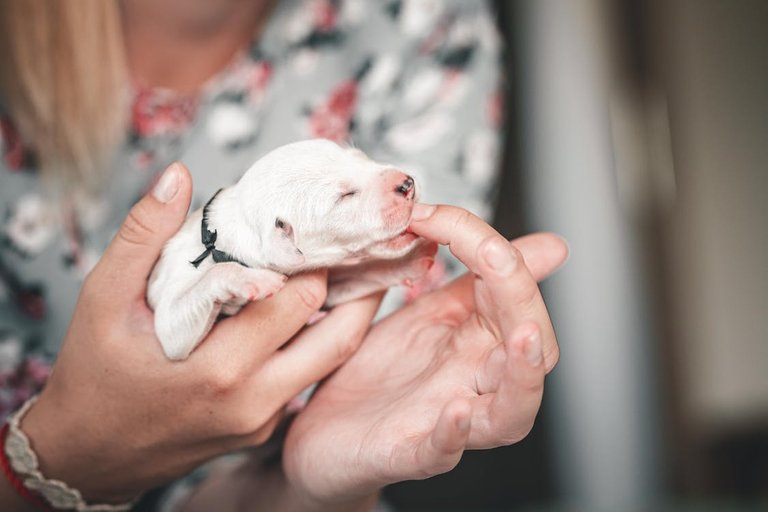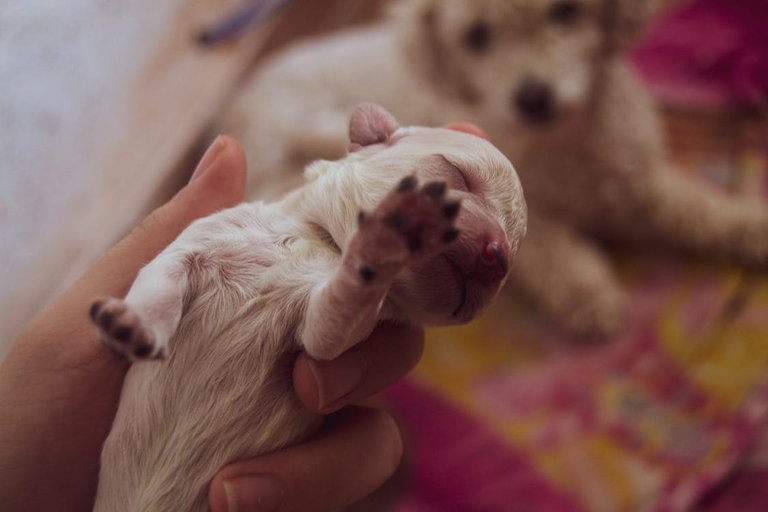What to do after your pet becomes a mother.
My friend called me a few days ago to share that her cute little dog has become a mother, I could feel the excitement in her voice, as she asked about the next procedure she needs to take to keep both the mother and her puppies safe and fine, I shared with her about the things I know and she was so excited, and it is for that purpose that I have decided to share for the consumption of lovely pet owners and the lovers of information what they should do after their lovely pets (referring to dogs in this post), become mothers.

pexels.com
Only a few would be able to relate to the joy they feel after their pets become mothers, but regardless of if the process of birth went very smoothly, there is still so much work to be done. It is very normal for the new mother to desire so much time with her puppies, it could get so bad within the first few days that she wouldn't even want to use the bathroom, as our eyes will be highly fixed on her babies, so you may need to get her on a leach for her to urinate and defecate, she will only want to stay out for just a few minutes, so use that opportunity to clean up her bed, and ensure that the area of abode is convenient for the puppies. Before she jumps back to stay with her puppies, check her nipples and her vulva to ensure there is no problem with it, problems like foul-smelling discharges, bleeding or other forms of abnormalities could occur, and you need to be sure that none of that is happening.
Right before I go deep into other considerations, let me lay a little emphasis on some of the occurring issues;
You need to check the vulva to figure out the presence of excessive discharge as mentioned before, the discharge would normally be greenish-black in color, this vaginal discharge should significantly decrease within 24-48 hours after birth, that is if she has not expelled all the afterbirths during birthing which could be quite a substantial amount. Also, it is important to check her nipples just to be sure that none of them is swollen, hot, red, hard, or tender, the milk ought to be whitish, if it is bloody or yellowish then something is wrong and with this discovery, you should instantly call your vet.
You may have to check your pet and her puppies with the vet after birth, this is for the vet to check the mother to ensure there is no form of infection and there is a production of sufficient milk, as well as the puppies and this is to ensure that there are no birth defects like cleft palates, at this stage, medications and injections will be taken will be administered during your visit to the vet.
Do not be in a rush to bathe your dog immediately after she gives birth, this is to prevent her puppies from coming in contact with soap residues, instead of bathing her, use a warm, damp cloth to gently clean her up. Bear in mind as well that your dog will be dehydrated and exhausted after birth, so she will need lots of water to help her heal and begin to produce milk for her puppies, it is a necessity that she has access to fresh water all the time.
Feeding your pet with essential nutrients at this stage is highly crucial, lactating dogs as well as puppies when they begin to eat solid food require good nutritional value. Home-cooked meals regardless of how properly prepared lack important nutrients needed for energy, growth, digestive health, and development. Without any medical issue, your pet can take care of her babies from when they are born, your own function is to ensure they are well-nourished, they are healthy, in a neat and safe environment.

pexels.com
Possible after birth problems.
Here are certain things to watch out for after the birth of puppies;
Vaginal Discharge Problems: The vaginal discharge is common and would last in little amounts for around eight weeks after puppies have been born, the discharge will appear to be reddish-black since it is made up of main blood, when the discharge is too bloody, has an odor, looks like pus, then your dog should be examined very fast, even if the discharge slows down and gets worse suddenly, this is also a sign to be examined.
Fever: Infection after birth is very common, you must learn to regularly check your dog's temperature, if it is over 102.5 and she is acting sick, then contact your vet immediately.
Eclampsia: Eclampsia is a drop in blood calcium levels that could happen during whelping, and weeks after birth, it is caused by the mother's inability to keep up with the calcium demand of lactation. Dogs who have this condition will experience abnormal mothering behaviors, itching of the nose or face, restlessness, muscle spasms, and even seizures in some cases.
Metritis (Inflamed Uterus): Metritis is a uterus inflammation, that can happen when there is a placenta retained or trauma happens during delivery. If there is a sign of fever, absence of appetite, vaginal discharge, lack of milk production, and lack of interest in puppies, then a vet should be contacted instantly.
Agalactia: Agalactia happens when milk is not been produced, in a case where the puppies are sucking but milk is not been produced, the help of a vet needs to be instantly sorted. The first milk, or colostrum, will provide puppies with the required nutrients and antibodies from the mother to help with the build-up of natural immunity to infections, the absence of these highly essential substances during the first 24 hours of life, will require extra veterinary care or they would not last.
Mastitis: Mastitis is the inflammation of the mammary tissues, it happens when the mammary becomes hard, red, and painful as a result of infection. The nursing mother will most likely get sore during the nursing stage, but the puppies need to continue to suck to help reduce swelling and promote the excretion of the infected material. While it does not hurt the puppies to consistently nurse on the glands even in the presence of infections, the glands have to be evaluated by a vet.
Conclusion.
New mothers (your pet) without any problem/infection will be able to take care of their puppies without difficulty until they are mature enough, but you must be ready to provide a safe space for both mother and puppies, then watch out for any sign of infection that may require urgent veterinary attention.
References.
https://pets.webmd.com/dogs/guide/caring-newborn-puppy
https://www.petmd.com/dog/conditions/reproductive/dog-pregnancy-birth-and-puppy-care-complete-guide
https://www.urbanpethospital.com/blog/post/care-mother-dog-pups-after-delivery
https://vcahospitals.com/know-your-pet/breeding-for-dog-owners-caring-for-newborn-puppies
https://wagwalking.com/wellness/caring-for-new-moms-postpartum-care-for-your-dog
https://petkeen.com/postpartum-care-for-mother-dogs-after-giving-birth/
Thanks for your contribution to the STEMsocial community. Feel free to join us on discord to get to know the rest of us!
Please consider delegating to the @stemsocial account (85% of the curation rewards are returned).
Thanks for including @stemsocial as a beneficiary, which gives you stronger support.
Congratulations @futurekr! You have completed the following achievement on the Hive blockchain And have been rewarded with New badge(s)
Your next target is to reach 45000 upvotes.
You can view your badges on your board and compare yourself to others in the Ranking
If you no longer want to receive notifications, reply to this comment with the word
STOPCheck out our last posts:
Support the HiveBuzz project. Vote for our proposal!